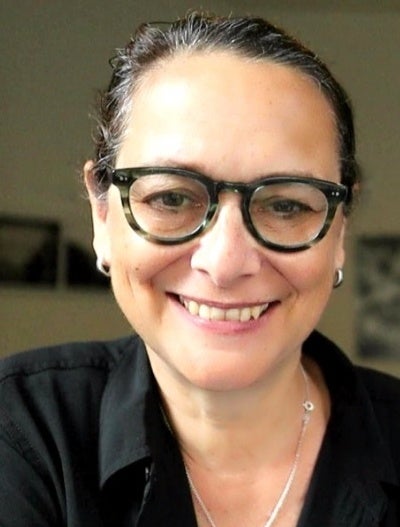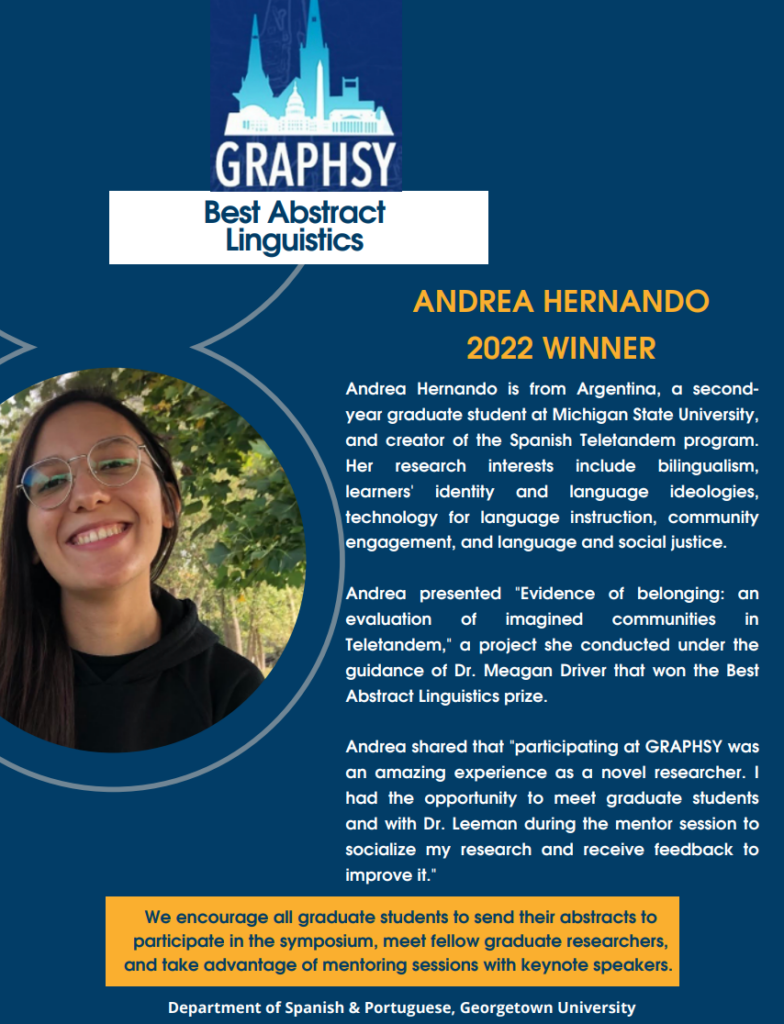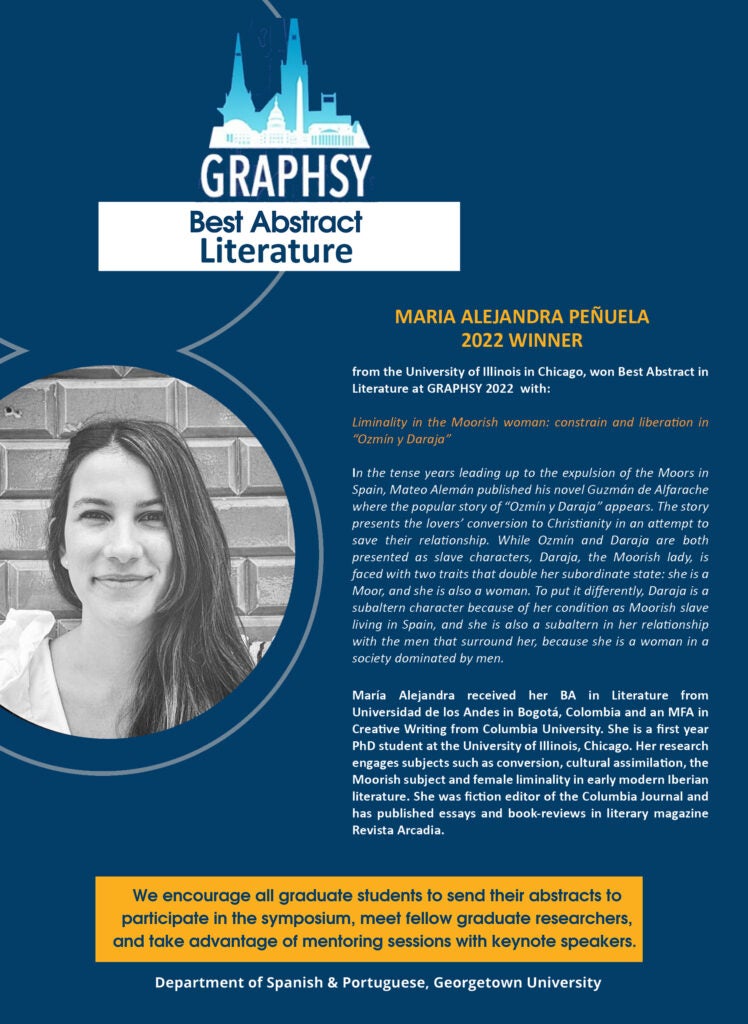GRAPHSY 2022

Event Information
14th Graduate Portuguese and Hispanic Symposium (GRAPHSY)
Identidades Híbridas: la imaginación de lo social / a imaginação do social
Friday, February 18, 2022
Contact: graphsy@georgetown.edu
No Fees
Register here to participate and to receive the program with the Zoom links in your email
Social media:
Facebook
Instagram
Twitter

To check the event schedule, click here
Theme:
This year’s conference welcomes proposals within the theme of Identidades Híbridas: la imaginación de lo social / a imaginação do social, encouraging the submission of a broad range of research in the fields of Linguistics, and Iberian and Latin American Literatures, and Cultures. GRAPHSY 2022 seeks to carry on a dialogue about the diversification of the “canonical” in the context of identity perspectives related to social categories such as gender and sexuality, age, race, class, and nationality. The idea of diversification also alludes to formal aspects of texts/works, such as the apparent opposition between fiction and non-fiction and other creative processes associated with concepts like assimilation, appropriation, and transculturation, among others. These considerations will shed light on the incidence of social and creative categories in the direction of cultural fluxes.
Submit an abstract here . The deadline for abstracts is January 14, 2022. You can find the call for abstracts here.
Speakers
Linguistics Keynote Panelists
Dr. Anna Babel (The Ohio State University)

Anna Babel is interested in the way that categories like ethnicity, gender, political affiliation and even the way we dress can affect the way that we use and understand language. Most of her research revolves around contact between Spanish and Quechua in Bolivia, the topic of her book, Between the Andes and the Amazon.
In addition, she teaches and engages in activism with Latinx communities in the US. A professor of Hispanic Linguistics at the Ohio State University since 2011, she has edited two scholarly volumes, published more than a dozen academic articles and book chapters, and been funded by the National Science Foundation, among other groups.
Dr. Víctor Corona (Université Paris 8)

Víctor Corona es originario de Ensenada, Baja California. Realizó estudios de literatura latinoamericana en la Universidad de Guanajuato (2003) y obtuvo el doctorado en Didáctica de la lengua y la literatura en la Universidad Autónoma de Barcelona (2012). Ha impartido cursos de etnografía, sociolingüística y multilingüe en varios países como España, México, Estados Unidos y Francia.
Actualmente es Profesor adjunto de la Universidad Paris 8 y miembro del grupo de investigación SFL (Structures Formelles du Langage, CNRS). Su trabajo se ha centrado en el estudio etnográfico de las variedades lingüísticas de la juventud migrante Europa, especialmente en el contexto de Barcelona.
Su interés investigador está relacionado con la etnografía lingüística en contextos educativos, lingüística de la interacción, estilizaciones lingüísticas, contacto de lenguas y construcción de identidad en contextos de migración.
Dr. Jennifer Leeman (George Mason University)

Jennifer Leeman (PhD, Georgetown University) is Professor of Spanish linguistics and founding director of the graduate certificate program in Spanish Heritage Language Education at George Mason University in Fairfax, Virginia. Her research focuses on the sociopolitics of language, with particular attention to Spanish in the US, as well as construction of ethnoracial and linguistic identities in censuses. She has published numerous articles and chapters on identities and ideologies in heritage language education; critical pedagogical approaches to teaching Spanish; and the interplay of ideologies of language, race and nation in the racialization of Latinxs in the US. She is author (with Janet Fuller) of Hablar español en Estados Unidos: La sociopolítica del lenguaje (Multilingual Matters, 2021).
Dr. José Magro (University of Maryland)

Raised in Alcorcón, Madrid, and a long-time resident of Brooklyn, José Magro holds a Ph.D. in Hispanic Linguistics with a specialization in critical applied sociolinguistics. He also holds a BS in Social Psychology, and he is a certified New York State 7-12 Spanish teacher with an M.Ed. His dissertation was titled “Language and Racism-Motivation, linguistic proficiency and awareness in the Spanish as a second language classroom: Integration of contents related to the socio-political nature of language in a content-based approach.” His primary areas of research are critical applied sociolinguistics, second language acquisition, bilingualism, language and identity, language ideologies, glotopolitics, Spanish as a heritage language in the USA, and, very particularly, Hip-Hop and explicitly antiracist pedagogies. A first-generation college graduate, he is also a well-known MC who, along with his rap group El Club de los Poetas Violentos, developed the foundations for Spanish rap during the early 1990s socio-politically charged peripheric Madrid scene. José Magro has published in peer-reviewed journals such as Journal of Sociolinguistics, Linguistics and Education, and Education for Information. He is currently working on Language and Antiracism in the (Spanish) language classroom (Multilingual Matters, under contract), a manuscript focused on integrating antiracist pedagogies in the language classroom.
Dr. Tracy Quan (University of Colorado Boulder)

Tracy Quan is a Spanish applied linguist at the University of Colorado Boulder in the Department of Spanish and Portuguese. She holds a PhD in Hispanic linguistics with a designated emphasis in Second Language Acquisition from the University of California, Davis. Her areas of research include second and heritage language development and education, language and identity, study abroad, and critical pedagogies. In particular, she is interested in exploring the dynamic role identities and ideologies play in shaping Spanish language learning and use for racialized multilingual populations, such as heritage speakers and Asian Latinxs. She hopes her research will demonstrate the transformative and equitable potential of language education and research if done critically and thoughtfully. She is co-editor of the volume, Heritage Speakers of Spanish and Study Abroad (2021, Routledge), and her work has appeared in venues such as Bilingual Research Journal, Foreign Language Annals, Hispania, L2 Journal, and The Modern Language Journal.
Literature Keynote Speaker
Dr. Odette Casamayor-Cisneros (University of Pennsylvania)

Odette Casamayor-Cisneros (Ph.D. École des Hautes Études en Sciences Sociales in Paris, 2002) is the author of Utopia, distopía e ingravidez: reconfiguraciones cosmológicas en la narrativa postsoviética cubana (Utopia, Dystopia and Ethical Weightlessness: Cosmological Reconfigurations in post-Soviet Cuban Fiction). Published by Iberoamericana-Vervuert in 2013, her book examines, through the lens of literary production, the existential void experienced by Cubans after the collapse of the Socialist Bloc in the 1990s.
Prof. Casamayor-Cisneros is currently writing a new book, On Being Blacks: Self-Identification Processes and Counter-Hegemonic Knowledge in Contemporary Cuban Cultural Production. Her first article on this topic, “Negros de papel. Algunas apariciones del negro en la narrativa cubana después de 1959,” received the 2003 Juan Rulfo International Essay Award in Paris. She is also the recipient of the 2009 José Juan Arrom National Prize of Literary Essay by the Union of Cuban Writers (UNEAC).
As a writer of fiction, Odette Casamayor has published the collection of stories Una casa en los Catskills (1st edition, La Secta de los Perros, 2012, and 2nd edition, Letras Cubanas, 2016). !


